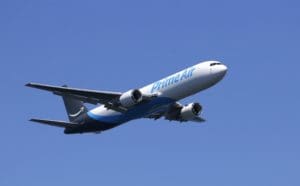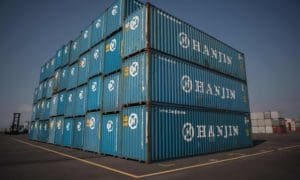 Welcome back! I certainly had a relaxing end of the year and was able to re-energize for 2017. One of the more fun things I did with my time off was to go skiing with my son. Unlike last year, I saw something new out on the slopes this year – RFID readers. In an interesting take on the technology, my lift ticket no longer fastened to the outside of my jacket. Instead, it was a plastic card that I kept in one of my pockets with an RFID chip in it. Before boarding the ski lift, you go through a gate that opens after it reads your tag. This is one of those use cases for RFID that I hadn’t thought of, but it makes total sense. Instead of relying on lift operators to spot a valid lift ticket on someone’s jacket or pants, they could just wait for you to come through the gate. Additionally, the cards are re-usable – I can simply reload the card online for another day of skiing. The only issue was for small kids, depending on where they kept the ticket, they might be tall enough for the reader to work. But that’s a small issue.
Welcome back! I certainly had a relaxing end of the year and was able to re-energize for 2017. One of the more fun things I did with my time off was to go skiing with my son. Unlike last year, I saw something new out on the slopes this year – RFID readers. In an interesting take on the technology, my lift ticket no longer fastened to the outside of my jacket. Instead, it was a plastic card that I kept in one of my pockets with an RFID chip in it. Before boarding the ski lift, you go through a gate that opens after it reads your tag. This is one of those use cases for RFID that I hadn’t thought of, but it makes total sense. Instead of relying on lift operators to spot a valid lift ticket on someone’s jacket or pants, they could just wait for you to come through the gate. Additionally, the cards are re-usable – I can simply reload the card online for another day of skiing. The only issue was for small kids, depending on where they kept the ticket, they might be tall enough for the reader to work. But that’s a small issue.
And now, on to the news.
- Amazon wins patent for flying warehouse
- Air Transport Services Group buys Pemco World Air Services
- Descartes acquires Datamyne
- China bans ivory trade
- Chinese couriers to collect $72 billion in 2017
- Korea Line Corp. will not take over Hanjin
- Van rates gain momentum
 Amazon is at it again with their drones. This time, the online retail giant has won a patent for a flying warehouse that will deploy drones to deliver parcels. The flying warehouse is essentially a launch pad for their drones, with claims that packages can be delivered in 10 minutes. The floating fulfillment center will be an airship or a blimp that floats at an altitude of around 45,000 feet. The ship will be stocked with commonly ordered items, and once an order is received, an unmanned drone will deliver the package. It is certainly an interesting thought, but one has the wonder if the economics match up. Considering the expense to keep the blimp afloat and the cost to re-stock (not to mention how to figure out what merchandise to stock), this could be a pipe dream more than a reality. But when it comes to Amazon, one can always expect the unexpected.
Amazon is at it again with their drones. This time, the online retail giant has won a patent for a flying warehouse that will deploy drones to deliver parcels. The flying warehouse is essentially a launch pad for their drones, with claims that packages can be delivered in 10 minutes. The floating fulfillment center will be an airship or a blimp that floats at an altitude of around 45,000 feet. The ship will be stocked with commonly ordered items, and once an order is received, an unmanned drone will deliver the package. It is certainly an interesting thought, but one has the wonder if the economics match up. Considering the expense to keep the blimp afloat and the cost to re-stock (not to mention how to figure out what merchandise to stock), this could be a pipe dream more than a reality. But when it comes to Amazon, one can always expect the unexpected.
 Speaking of Amazon, one of the two providers of their air cargo operation has acquired an aircraft maintenance business. Air Transport Services Group Inc. said Tuesday that it had bought Pemco World Air Services Inc., which maintains planes for a number of carriers. The company also specializes in the Boeing 767 jets, which are the centerpiece of Amazon’s outsourced Prime Air cargo airline. This move puts Air Transport Services Group into potential competition with Boeing when it comes to converting passenger planes for cargo use. Although Pemco does not currently convert 767 jets from passenger to cargo, it does convert 737’s, which they see demand rising for. However, there is certainly nothing holding the company back from converting 767’s in the future.
Speaking of Amazon, one of the two providers of their air cargo operation has acquired an aircraft maintenance business. Air Transport Services Group Inc. said Tuesday that it had bought Pemco World Air Services Inc., which maintains planes for a number of carriers. The company also specializes in the Boeing 767 jets, which are the centerpiece of Amazon’s outsourced Prime Air cargo airline. This move puts Air Transport Services Group into potential competition with Boeing when it comes to converting passenger planes for cargo use. Although Pemco does not currently convert 767 jets from passenger to cargo, it does convert 737’s, which they see demand rising for. However, there is certainly nothing holding the company back from converting 767’s in the future.
 Logistics technology provider Descartes Systems Group is continuing with its growth by acquisition plan with its recent announcement of the acquisition of Datamyne Inc. Datamyne provides cloud-based trade data content solutions for customers to analyze import and export trade activity. Descartes sees the addition of Datamyne’s solution, which collects, cleanses, and commercializes logistics trade data from over 50 nations, as a natural fit with their expanding global logistics network. According to Descartes CEO Edward J. Ryan, “Datamyne broadens our trade data content footprint beyond customs and regulatory data and into logistics trade data.” Descartes paid $52.7 million in the acquisition.
Logistics technology provider Descartes Systems Group is continuing with its growth by acquisition plan with its recent announcement of the acquisition of Datamyne Inc. Datamyne provides cloud-based trade data content solutions for customers to analyze import and export trade activity. Descartes sees the addition of Datamyne’s solution, which collects, cleanses, and commercializes logistics trade data from over 50 nations, as a natural fit with their expanding global logistics network. According to Descartes CEO Edward J. Ryan, “Datamyne broadens our trade data content footprint beyond customs and regulatory data and into logistics trade data.” Descartes paid $52.7 million in the acquisition.
 In a move that will aid in the crackdown on elephant poaching in Africa, China has announced that it will ban all ivory trade. In an announcement, the country said that it was banning all commerce in ivory by the end of 2017. As the world’s largest ivory market, this deals a significant blow to elephant poachers (thankfully). The shutdown of the ivory trade will occur in phases throughout the year, first by closing authorized ivory processing facilities. This announcement comes after years of global pressure by wildlife advocates to protect the animals as well as the decision by the United States to end its domestic ivory trade. Even so, the ivory market will never go away, and the black market will most likely see an influx of inventory and demand.
In a move that will aid in the crackdown on elephant poaching in Africa, China has announced that it will ban all ivory trade. In an announcement, the country said that it was banning all commerce in ivory by the end of 2017. As the world’s largest ivory market, this deals a significant blow to elephant poachers (thankfully). The shutdown of the ivory trade will occur in phases throughout the year, first by closing authorized ivory processing facilities. This announcement comes after years of global pressure by wildlife advocates to protect the animals as well as the decision by the United States to end its domestic ivory trade. Even so, the ivory market will never go away, and the black market will most likely see an influx of inventory and demand.
Speaking of China, the courier service sector is set to explode. According to postal officials, the sector is expected to generate $72 billion in revenues this year. In 2016 alone, 31.3 billion parcels were sent and over 200,000 jobs were created. While estimates on the number of new jobs created were not available, the head of the State Post Bureau indicated that 2017 will see 40 billion parcels sent. There are main drivers behind this growth. First is the rise of e-commerce in China, as now even remote and rural areas have access to the internet for online shopping. The second is the expansion of delivery infrastructure – courier services now cover 80% of towns and villages, and the country is continuing to expand the network.
 Korea Line Corp., which is a bulk carrier, has said it will not take over Hanjin Shipping Co.’s service, as was rumored. Instead, their parent company Samra Midas Group (SM Group), will create a separate company called SM Lines that will operate Hanjin’s liner business between the Far East and United States. Stakeholders within Korea Line were against the proposal to take over Hanjin’s operations after the company went bankrupt. The main reason cited was the fact that Korea Line Corp. does not have experience in the container shipping business.
Korea Line Corp., which is a bulk carrier, has said it will not take over Hanjin Shipping Co.’s service, as was rumored. Instead, their parent company Samra Midas Group (SM Group), will create a separate company called SM Lines that will operate Hanjin’s liner business between the Far East and United States. Stakeholders within Korea Line were against the proposal to take over Hanjin’s operations after the company went bankrupt. The main reason cited was the fact that Korea Line Corp. does not have experience in the container shipping business.
And finally, rates for dry van loads in December climbed to their highest monthly average since June, tying that month for the strongest van rates since early fall 2015, according to monthly rate data from Truckstop.com. Reefer and flatbed rates in the month were mostly unchanged from November. Van’s per-mile average in December, based on verified rates paid to carriers from brokers and shippers, was $1.97 — a 6-cent jump from November and the biggest month-to-month gain the segment has seen in nearly two years. Flatbed rates in December gained a penny from November. The segment’s December per-mile average was $2.02, down 11 cents from December 2015. Reefer rates saw no month-to-month change in December. The segment’s $2.02 a mile average was 10 cents lower than December 2015.
That’s all for this week. Enjoy the weekend and the song of the week, Welcome Back by John Sebastian.


















Great article. The biggest impression to me is that China banned ivory trade and Amazon drones. I can’t belive they pulled it off. Good news for them, i think that flying warehouse will do good in the long run for Amazon. Also, in my opinion the most important things about online selling are actually fulfillment services. It’s not just Amazon that people can trust, there’s so many companies that are good in this area, and even for the less money, you can get better service. Distribution is everything. Drones are the future.